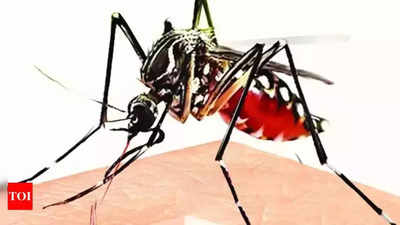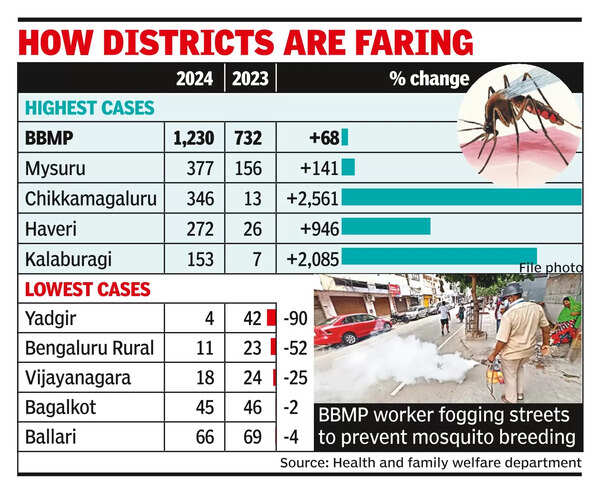- News
- City News
- bengaluru News
- Dengue nos. up 140%; Karanataka govenment cites surveillance stronger
Trending
Dengue nos. up 140%; Karanataka govenment cites surveillance stronger
Karnataka has seen a 140% increase in dengue cases this year, with health officials reassuring that the rise is due to enhanced surveillance measures.

Representative image
Between Jan 1 and June 18, 2024, the state has seen 4,886 dengue cases — up from 2,003 during the same period last year.The rise, though, hasn’t been uniform across the state. While Chikkamagaluru and Kalaburagi districts have seen cases increase by 20-25 times, Yadgir has seen a 90% drop, Bengaluru Rural 50%, and Vijayanagara 25%. In BBMP limits, cases have gone up 68%, from 732 to 1,230.

A senior health official attributed the rise in dengue cases to increased testing and early identification. According to data accessed by TOI, dengue tests have risen from 23,041 in 2023 to 39,253 in 2024.
“Today, many people are aware of dengue, whereas earlier they might have mistaken it for viral fever. With proper awareness, the cases are now coming to light,” said the official.
Chikkamagaluru has seen the number of cases go up by 25 times, from 13 to 346. District officials pointed out that tests too have gone up 300%, from 441 to 1,862. District health officer Ashwath Babu attributed the increase in cases to seasonal changes and greater testing. “During April and May, there was a spike in cases, but in June, the numbers are decreasing,” he said, also noting a decrease in platelet demand and lower viral load in recent cases.
Babu highlighted a change in testing protocols. “Many private hospitals were declaring positives with just NS1 Elisa tests, so we have now made it compulsory to use IgM Mac Elisa tests,” the DHO explained.
Belagavi district saw cases rise 75%, from 78 to 137, and tests go up 25%, from 975 to 1226. DHO Mahesh Koni said, “Khanapur, Bailhongal, Ramdurg, and Belagavi city are the primary hubs for dengue cases. Contaminated water is flowing into homes, leading to mosquito breeding and larvae sites, causing dengue.”
Oil does the trick
In Vijayanagara district, where cases have dropped 25% (from 24 to 18), officials said their unique edible oil-spraying trick has done wonders. DHO Dr Shankar Naik said, “This is primarily due to our pre-monsoon efforts and activities. We started larvae surveys in the summer and identified prominent breeding sites. Wherever there is stagnant water, we spray 10ml of oil on it to prevent oxygen from entering, thus preventing further breeding.” Dr Prabhuling Manakar, DHO of Yadgir, said source reduction is key to controlling the spread of dengue. “Asha workers are inspecting every house and conducting IEC (information education and communication) activities frequently,” he pointed out.
A special initiative in Yadgir involves organizing an Arogya Mela every Wednesday, where health officers spread awareness about dengue, typhoid, cholera, and other diseases. “We also use the support of cultural groups to engage people and educate them,” Manakar added.
End of Article
FOLLOW US ON SOCIAL MEDIA










